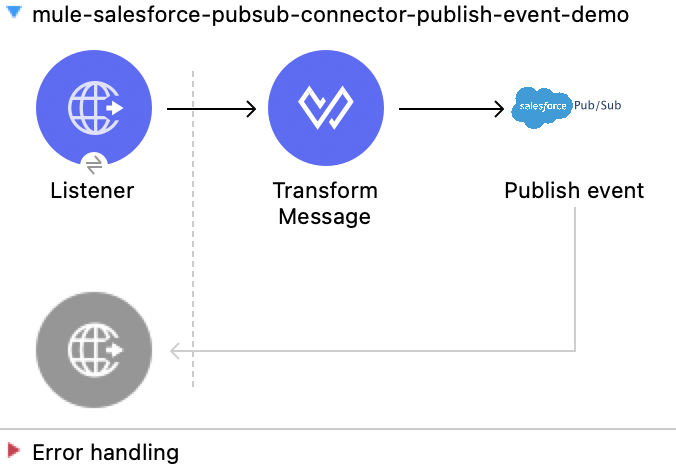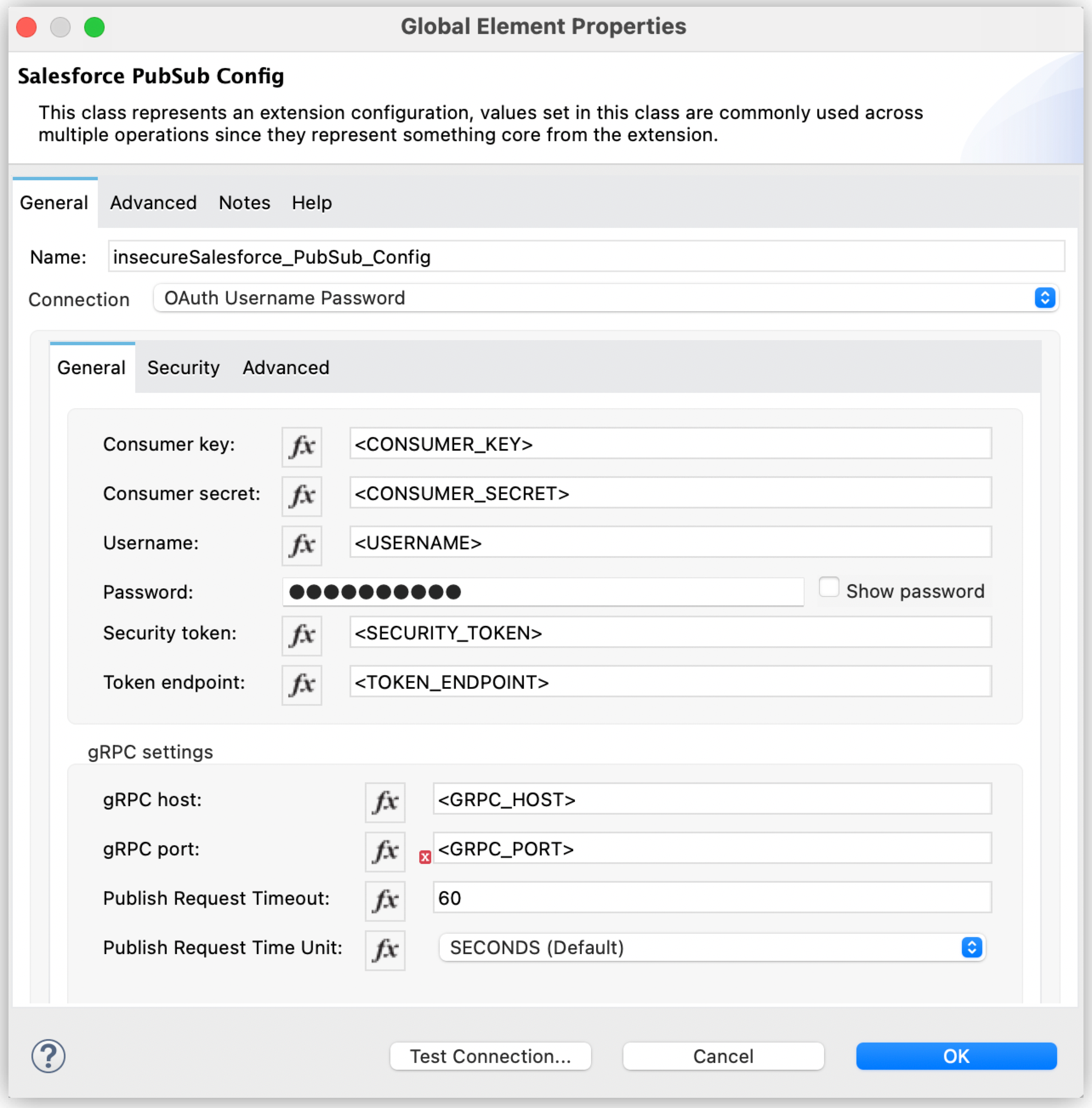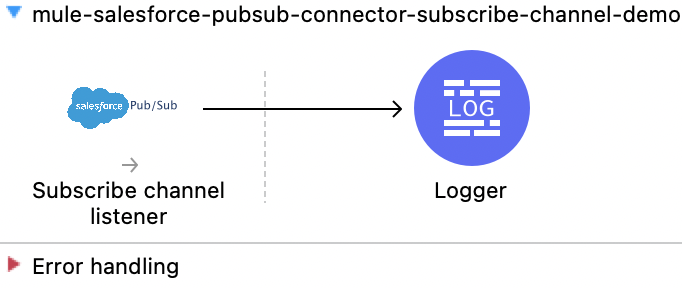m4-config.username=<username within Salesforce Pub/Sub system> m4-config.password=<password for the username within Salesforce Pub/Sub system> m4-config.securityToken=<security token within Salesforce Pub/Sub system> m4-config.url=<endpoint representing your development environment>
Salesforce Pub/Sub Connector 1.2 Examples
The following examples show several Mule flows for Salesforce Pub/Sub Connector:
Configure a Connection
To secure connections, you must specify the connection field values. To do this:
Create a Configuration File for a Connection
Create a configuration file that includes properties for a connection:
-
Create a file named
mule-app.propertiesin the/src/main/resources/folder. -
In the
mule-app.propertiesfile, create a set of properties for the connection, similar to the ones that follow, replacing the bracketed text (including the brackets) with the correct values for your configuration:The properties used vary depending on the selected connection configuration.
For more information about creating a properties file, refer to Configuring Property Placeholders.
Configure the Connection Global Elements
Configure global elements for connection:
-
Create a new Mule project.
-
In the Mule Palette view, click Search in Exchange and enter
Salesforce Pub/Sub. -
Add Salesforce Pub/Sub Connector to the Selected modules section and click Finish.
-
Click the Global Elements tab and click Create.
-
Select Connector Configuration > Salesforce Pub/Sub Config and click OK.
-
Enter the values to configure either Basic Authentication, OAuth v2.0, OAuth JWT, OAuth Username Password, or OAuth SAML. Note that the
Basic Authenticationconnection type is only supported for Salesforce API v64.0 and earlier versions. -
Click the Test Connection button to ensure there is connectivity with the Salesforce Pub/Sub API. A successful message should pop up.
-
Click OK.
-
Open the HTTPS Listener config in Global Element Configuration.
-
Click the TLS tab and select TLS Configuration > Edit inline.
-
Specify the Key Store Configuration with the generated keystore details to enable HTTPS on this configuration.
-
Click OK.
Configure a Global Element for the Properties File
Configure a global element for the mule-app.properties file so that Mule knows
where to find it:
-
Click the Global Elements tab and click Create.
-
In the Choose Global Type dialog, select Configuration properties and click OK.
-
In the File field, enter
mule.app.properties. -
Click OK.
Publish an Event
This example Mule flow publishes an event and uses the following operations:
-
HTTP Listener
Accepts data from HTTP requests. -
Transform Message
Outputs the data in Java. -
Publish event
Publishes the given list of events to the specified event topic. Only high-volume platform events, including real-time event monitoring events and change data capture events, are allowed.Enter the following values:
Field Value Topic
Name of the topic used for message publishing, for example,
/event/gRPCMunitTestDoNotDelete__eJob Id
payload

XML for This Example
Paste this code into the Studio XML editor to quickly load the flow for this example into your Mule app:
<?xml version="1.0" encoding="UTF-8"?>
<mule xmlns:ee="http://www.mulesoft.org/schema/mule/ee/core"
xmlns:http="http://www.mulesoft.org/schema/mule/http" xmlns:salesforce-pub-sub="http://www.mulesoft.org/schema/mule/salesforce-pub-sub" xmlns="http://www.mulesoft.org/schema/mule/core" xmlns:doc="http://www.mulesoft.org/schema/mule/documentation" xmlns:xsi="http://www.w3.org/2001/XMLSchema-instance" xsi:schemaLocation="http://www.mulesoft.org/schema/mule/core http://www.mulesoft.org/schema/mule/core/current/mule.xsd
http://www.mulesoft.org/schema/mule/salesforce-pub-sub http://www.mulesoft.org/schema/mule/salesforce-pub-sub/current/mule-salesforce-pub-sub.xsd
http://www.mulesoft.org/schema/mule/http http://www.mulesoft.org/schema/mule/http/current/mule-http.xsd
http://www.mulesoft.org/schema/mule/ee/core http://www.mulesoft.org/schema/mule/ee/core/current/mule-ee.xsd">
<configuration-properties file="mule-app.properties"/>
<salesforce-pub-sub:pubsub-config name="Salesforce_PubSub_Config" >
<salesforce-pub-sub:basic-connection username="${m4-config.username}" password="${m4-config.password}" securityToken="${m4-config.securityToken}" url="${m4-config.url}"/>
</salesforce-pub-sub:pubsub-config>
<http:listener-config name="HTTP_Listener_config" doc:name="HTTP Listener config" doc:id="3805c5f1-0f01-476a-a619-a03f34dadfdd" >
<http:listener-connection host="0.0.0.0" port="8081" />
</http:listener-config>
<flow name="mule-salesforce-pubsub-connector-publish-event-demo" doc:id="9e2df8f5-1b47-4a76-ac62-941c989cd93b" >
<http:listener doc:name="Listener" doc:id="6e06a214-3112-40ef-8720-f730121aa5e0" config-ref="HTTP_Listener_config" path="/publish-event"/>
<ee:transform>
<ee:message>
<ee:set-payload><![CDATA[%dw 2.0
output application/java
---
[{
CreatedDate: 12334455,
CreatedById: "123",
Desc__c: "Something"
},{
CreatedDate: 12334456,
CreatedById: "1234",
Desc__c: "Something2"
}
]]]>
</ee:set-payload>
</ee:message>
</ee:transform>
<salesforce-pub-sub:publish-event config-ref="Salesforce_PubSub_Config" topic="/event/gRPCMunitTestDoNotDelete__e"/>
</flow>
</mule>Configure Publish Request Timeout
This example shows how to configure the Publish Request Timeout and Publish Request Time Unit parameters to control the timeout behavior for publish operations. This is useful when you want to ensure that publish requests don’t wait indefinitely and have specific timeout requirements. This example Mule flow configures timeout settings.
The key timeout configuration parameters are:
| Field | Value |
|---|---|
Publish Request Timeout |
|
Publish Request Time Unit |
|

XML for This Example
Paste this code into the Studio XML editor to quickly load the flow for this example into your Mule app:
<?xml version="1.0" encoding="UTF-8"?>
<mule xmlns:scripting="http://www.mulesoft.org/schema/mule/scripting"
xmlns:tls="http://www.mulesoft.org/schema/mule/tls" xmlns:http="http://www.mulesoft.org/schema/mule/http"
xmlns:os="http://www.mulesoft.org/schema/mule/os"
xmlns:ee="http://www.mulesoft.org/schema/mule/ee/core" xmlns:salesforce-pub-sub="http://www.mulesoft.org/schema/mule/salesforce-pub-sub" xmlns="http://www.mulesoft.org/schema/mule/core" xmlns:doc="http://www.mulesoft.org/schema/mule/documentation" xmlns:xsi="http://www.w3.org/2001/XMLSchema-instance" xsi:schemaLocation="
http://www.mulesoft.org/schema/mule/scripting http://www.mulesoft.org/schema/mule/scripting/current/mule-scripting.xsd http://www.mulesoft.org/schema/mule/core http://www.mulesoft.org/schema/mule/core/current/mule.xsd
http://www.mulesoft.org/schema/mule/salesforce-pub-sub http://www.mulesoft.org/schema/mule/salesforce-pub-sub/current/mule-salesforce-pub-sub.xsd
http://www.mulesoft.org/schema/mule/ee/core http://www.mulesoft.org/schema/mule/ee/core/current/mule-ee.xsd
http://www.mulesoft.org/schema/mule/os http://www.mulesoft.org/schema/mule/os/current/mule-os.xsd
http://www.mulesoft.org/schema/mule/http http://www.mulesoft.org/schema/mule/http/current/mule-http.xsd
http://www.mulesoft.org/schema/mule/tls http://www.mulesoft.org/schema/mule/tls/current/mule-tls.xsd">
<salesforce-pub-sub:pubsub-config name="insecureSalesforce_PubSub_Config" doc:name="Salesforce PubSub Config" >
<salesforce-pub-sub:oauth-user-pass-connection consumerKey="<CONSUMER_KEY>" consumerSecret="<CONSUMER_SECRET>" username="<USERNAME>" password="<USERNAME>" securityToken="<SECURITY_TOKEN>" tokenEndpoint="<TOKEN_ENDPOINT>" host="<GRPC_HOST>" port="0000" publishRequestTimeout="60" >
</salesforce-pub-sub:oauth-user-pass-connection>
</salesforce-pub-sub:pubsub-config>
<os:object-store name="replayObjectStore" doc:name="Object store" entryTtlUnit="DAYS" expirationIntervalUnit="DAYS" entryTtl="1"/>
<http:listener-config name="HTTP_Listener_config" doc:name="HTTP Listener config" >
<http:listener-connection host="0.0.0.0" port="8081" />
</http:listener-config>
<flow name="ytaoka-salesforce-pubsublistenerFlow1" initialState="started">
<http:listener doc:name="Listener" config-ref="HTTP_Listener_config" path="/publish"/>
<logger level="INFO" doc:name="Logger" message="Before Publish" />
<salesforce-pub-sub:publish-event config-ref="insecureSalesforce_PubSub_Config" topic="/event/gRPCMunitTestDoNotDelete__e">
</salesforce-pub-sub:publish-event>
<logger level="INFO" doc:name="Logger" message="After Publish"/>
</flow>
</mule>Subscribe to a Channel
This example Mule flow subscribes to a channel and uses the following operations:
-
Subscribe channel listener
Subscribes to a streaming channel. This source provides channel-related notification settings for new events that occur after you subscribe.A channel must be published to Salesforce before a subscription to the channel is created. Enter the following values:
Field Value Channel name
Name of the streaming channel to subscribe to, for example,
/event/gRPCMunitTestDoNotDelete__eReplay option
One of the given implementations, for example,
Earliest. For more information on how to useReplay id from object storein Replay option, refer to Store the Replay ID in the Object Store.Batch events size
Total number of events included in a server batch. Lower values indicate small memory footprint with more server calls, while bigger values indicate bigger memory footprint with fewer API calls. A new batch of events is requested by the connector after the flow consumes the existing events, for example,
1000 -
Logger
Shows the HTTP response from the Subscribe channel listener source

XML for This Example
Paste this code into the Studio XML editor to quickly load the flow for this example into your Mule app:
<?xml version="1.0" encoding="UTF-8"?>
<mule xmlns:ee="http://www.mulesoft.org/schema/mule/ee/core"
xmlns:http="http://www.mulesoft.org/schema/mule/http" xmlns:salesforce-pub-sub="http://www.mulesoft.org/schema/mule/salesforce-pub-sub" xmlns="http://www.mulesoft.org/schema/mule/core" xmlns:doc="http://www.mulesoft.org/schema/mule/documentation" xmlns:xsi="http://www.w3.org/2001/XMLSchema-instance" xsi:schemaLocation="http://www.mulesoft.org/schema/mule/core http://www.mulesoft.org/schema/mule/core/current/mule.xsd
http://www.mulesoft.org/schema/mule/salesforce-pub-sub http://www.mulesoft.org/schema/mule/salesforce-pub-sub/current/mule-salesforce-pub-sub.xsd
http://www.mulesoft.org/schema/mule/http http://www.mulesoft.org/schema/mule/http/current/mule-http.xsd
http://www.mulesoft.org/schema/mule/ee/core http://www.mulesoft.org/schema/mule/ee/core/current/mule-ee.xsd">
<configuration-properties file="mule-app.properties"/>
<salesforce-pub-sub:pubsub-config name="Salesforce_PubSub_Config" >
<salesforce-pub-sub:basic-connection username="${m4-config.username}" password="${m4-config.password}" securityToken="${m4-config.securityToken}" url="${m4-config.url}"/>
</salesforce-pub-sub:pubsub-config>
<http:listener-config name="HTTP_Listener_config" doc:name="HTTP Listener config" doc:id="3805c5f1-0f01-476a-a619-a03f34dadfdd" >
<http:listener-connection host="0.0.0.0" port="8081" />
</http:listener-config>
<flow name="mule-salesforce-pubsub-connector-subscribe-channel-demo" doc:id="4faf2bf8-e2af-43bc-bba8-d336761800dd" >
<salesforce-pub-sub:subscribe-channel-listener channelName="/event/gRPCMunitTestDoNotDelete__e" config-ref="Salesforce_PubSub_Config" eventBatchSize="1000">
<salesforce-pub-sub:replay-option >
<salesforce-pub-sub:earliest />
</salesforce-pub-sub:replay-option>
</salesforce-pub-sub:subscribe-channel-listener>
<logger level="INFO" doc:name="Logger" doc:id="21652e14-de84-4752-a9b9-871dc346befb" message="#[payload]"/>
</flow>
</mule>


